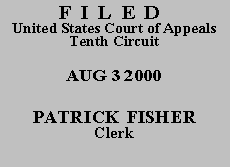

| DANIEL DEAN BETTS,
Plaintiff-Appellant, v. UNITED STATES OF AMERICA, Defendant-Appellee. |
|
Plaintiff Daniel Dean Betts appeals the district court's entry of summary judgment in favor of the United States, on his claim brought pursuant to the Federal Tort Claims Act, 28 U.S.C. §§ 1346(b), 2671-2680 (FTCA). He claimed that a federal agency wrongfully refused to hire him because he would not withdraw a pending claim for unemployment insurance benefits. Because the United States has liability under the FTCA only when the applicable state law would impose it, and plaintiff has not shown that Colorado recognizes a tort claim for wrongful failure to hire, we affirm.
Plaintiff worked as an unpaid volunteer in a Denver, Colorado, laboratory of the United States Geological Survey (USGS) during the summer of 1993 and 1994. He then was awarded a contract to provide services to the USGS in August 1994 and again in June 1995. Plaintiff worked under contract for the USGS until November 1995, when the federal government furloughed all non-essential employees as a result of an impasse in negotiations for federal appropriations.
Plaintiff was not called back when the furloughed federal employees returned to work at the USGS. As a result, he filed a claim for federal unemployment insurance benefits, which was initially denied on the basis that he was not an employee of the USGS. On appeal, based on plaintiff's testimony that he worked under the direction and control of a supervisor at USGS, it was ruled that he was a USGS employee and was entitled to unemployment benefits.
Shortly thereafter, plaintiff applied to the USGS for a graduate student appointee position. The USGS did not hire him. Plaintiff alleges in his FTCA complaint that a USGS regional director withheld approval to hire him unless he withdrew his unemployment benefits claim. Plaintiff contends the USGS' failure to hire him was "in tortious retaliation for his having filed a claim for federal unemployment insurance benefits . . . in violation of the public policy of Colorado." Complaint, Appellant's App. at 5a. The district court granted summary judgment in favor of the United States on this claim and two other claims not raised on appeal.
"We review the district court's grant of summary judgment de novo, applying the same legal standard used by the district court." Charter Canyon Treatment Ctr. v. Pool Co., 153 F.3d 1132, 1135 (10th Cir. 1998). Summary judgment is proper if the movant shows that "there is no genuine issue as to any material fact and that the moving party is entitled to a judgment as a matter of law." Fed. R. Civ. P. 56(c).
The FTCA grants federal district courts jurisdiction over a specific category of tort claims for which the United States has waived its sovereign immunity. See FDIC v. Meyer, 510 U.S. 471, 477 (1994). Under the FTCA, the United States is liable in tort "in the same manner and to the same extent as a private individual under like circumstances." 28 U.S.C. § 2674. It is liable for certain damages "caused by the negligent or wrongful act or omission of any employee of the Government while acting within the scope of his office or employment, under circumstances where the United States, if a private person, would be liable to the claimant in accordance with the law of the place where the act or omission occurred." Id. § 1346(b). There is no jurisdiction to hear a claim under the FTCA unless the applicable state law recognizes a comparable tort claim for private persons. See Meyer, 510 U.S. at 477-78; Ayala v. United States, 49 F.3d 607, 610 (10th Cir. 1995). Courts "look to the law of the state in which the alleged tortious activity occurred to resolve questions of liability under the FTCA." Ayala, 49 F.3d at 611. "We review the district court's determinations of state law de novo." Id.
Plaintiff concedes that Colorado does not recognize his asserted claim, which he characterizes as a claim for "tortious retaliation by prospective employers." Appellant's Br. at 8. He argues, however, that the district court failed to consider whether his novel tort claim would be a reasonable extension of Colorado law. He cites Pedlow v. Stamp, 819 P.2d 1110, 1111 (Colo. Ct. App. 1991), which noted that Colorado does not impose tort liability on an employer for attempting to coerce prospective employees to forego their statutory rights by denying them employment, but held that it was not frivolous to argue for such an extension of Colorado law. We reject this argument.
Whether a State should recognize a new tort cause of action is not an appropriate inquiry under the FTCA. "[T]he relevant question under the FTCA is whether a state-law duty exists, not whether a court can create or 'recognize' one." Leleux v. United States, 178 F.3d 750, 759 (5th Cir. 1999). Because plaintiff failed to state a claim under state tort law, a necessary prerequisite for recovery under the FTCA, the district court correctly granted summary judgment in favor of the United States.
The judgment of the United States District Court for the District of Colorado is AFFIRMED.
Entered for the Court
Circuit Judge
*. This order and judgment is not binding precedent, except under the doctrines of law of the case, res judicata, and collateral estoppel. The court generally disfavors the citation of orders and judgments; nevertheless, an order and judgment may be cited under the terms and conditions of 10th Cir. R. 36.3.